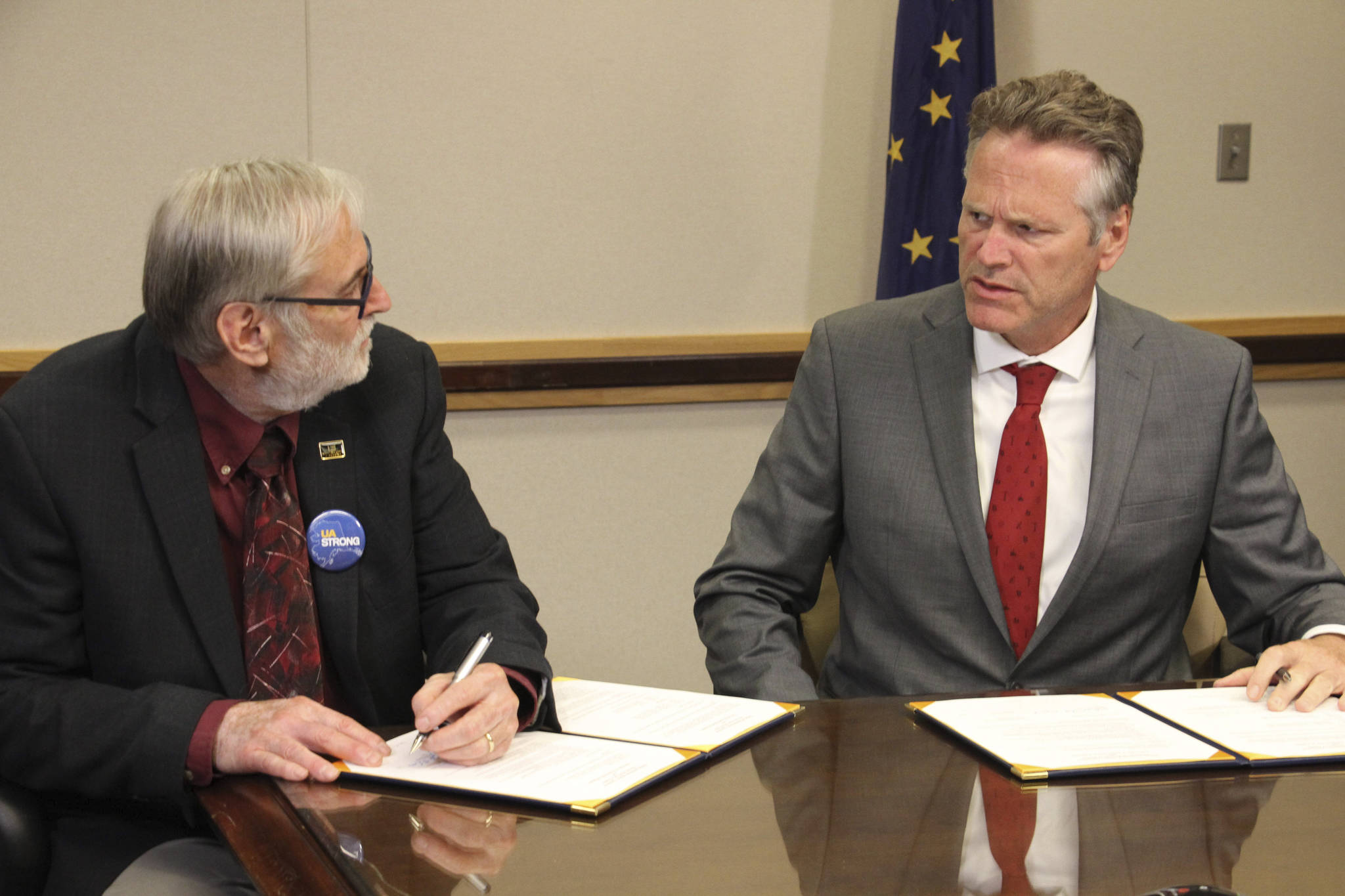Gov. Mike Dunleavy and University of Alaska Board of Regents Chair John Davies signed an agreement Tuesday afternoon that would reduce the university’s budget a total of $70 million over three years instead the $136 million in one year as originally proposed.
The agreement was a result of negotiations between the governor’s administration and the Board of Regents which ended in both sides agreeing to a number of commitments.
On the university side, the Regents agreed to a number of cost-cutting and streamlining measures such as the reduction of administrative overheads and increased focused on remote-access, or online, education.
Dunleavy’s office agreed to support “budgeted amounts agreed upon,” and the Alaska Performance Scholarship and Alaska Education Grant programs, according to the text of the agreement.
“A $70 million reduction, even over three years is a serious reduction. It will require careful review and streamlining of administrative structure, academic programs, and services to ensure that resources are focused on student access and achievement,” University of Alaska President Jim Johnsen said. “But by restoring the legislature’s appropriated funding for this fiscal year, and by spreading reductions out over the next two years, the required restructuring can be done more methodically, with less impact on students.”
The governor does not have power to appropriate funds for the university, only the Legislature can do that. However, the governor can veto items where he sees fit. According to the agreement, the governor will support the university’s proposed budget so long as the Board of Regents maintain a commitment to cost reductions and and revenue increases.
The agreement states that the Regents will report to the governor’s office and the legislature each year for three years in order to demonstrate the commitment to the strategic goals and 11 enumerated priorities.
Among the priorities stated in the agreement are, operating cost reductions, administrative overhead reductions, growth in monetization of university assets, research income increases and technology investments to lower costs and increase access.
Davies said that while this agreement still constituted a significant reduction for the university, the supplemental operating budget provided, “much more certainty and confidence for our students, staff, faculty and the communities we serve.”
On July 31, the Board of Regents voted to transition the university to a single accreditation model which would create a much more slimmed down version of the current university system.
Johnsen maintains that model is the best option for maintaining the university’s focus on student programs and providing the quality education the state needs.
“As an educator, a father, and a graduate of the University of Alaska, I believe in a strong university,” Dunleavy said. “I also believe we must balance state support for the UA system with the very serious fiscal situation we face today. This agreement, which comes after extensive conversations and work with the university, is an honest attempt at balancing both realities.”
Several legislators responded to the announcement with mixed emotions. In a letter sent out by the House Majority, several lawmakers said that they were pleased to see the funds restored, but that they intend to ensure UA receives adequate funding.
“The prospect of removing $135 million from the University of Alaska budget created an unnecessary crisis,” Rep. Adam Wool, D-Fairbanks, said in the statement. “While I am relieved to see a level of certainty for the university system, the possibility of $70 million in additional cuts in the coming years is troubling and needs to be closely examined.”
House Speaker Bryce Edgmon, I-Dillingham, said he was concerned by the governor seeming to act as an appropriator, something which only the legislature is allowed to do.
“While I am supremely grateful that the University of Alaska will not face such drastic cuts today,” Edgmon said, “these vetoes never should have happened in the first place. I remain concerned about the potential impacts of future reductions, and I firmly stand by the legislature’s role as the appropriating body.”
• Contact reporter Peter Segall at 523-2228 or psegall@juneauempire.com.

